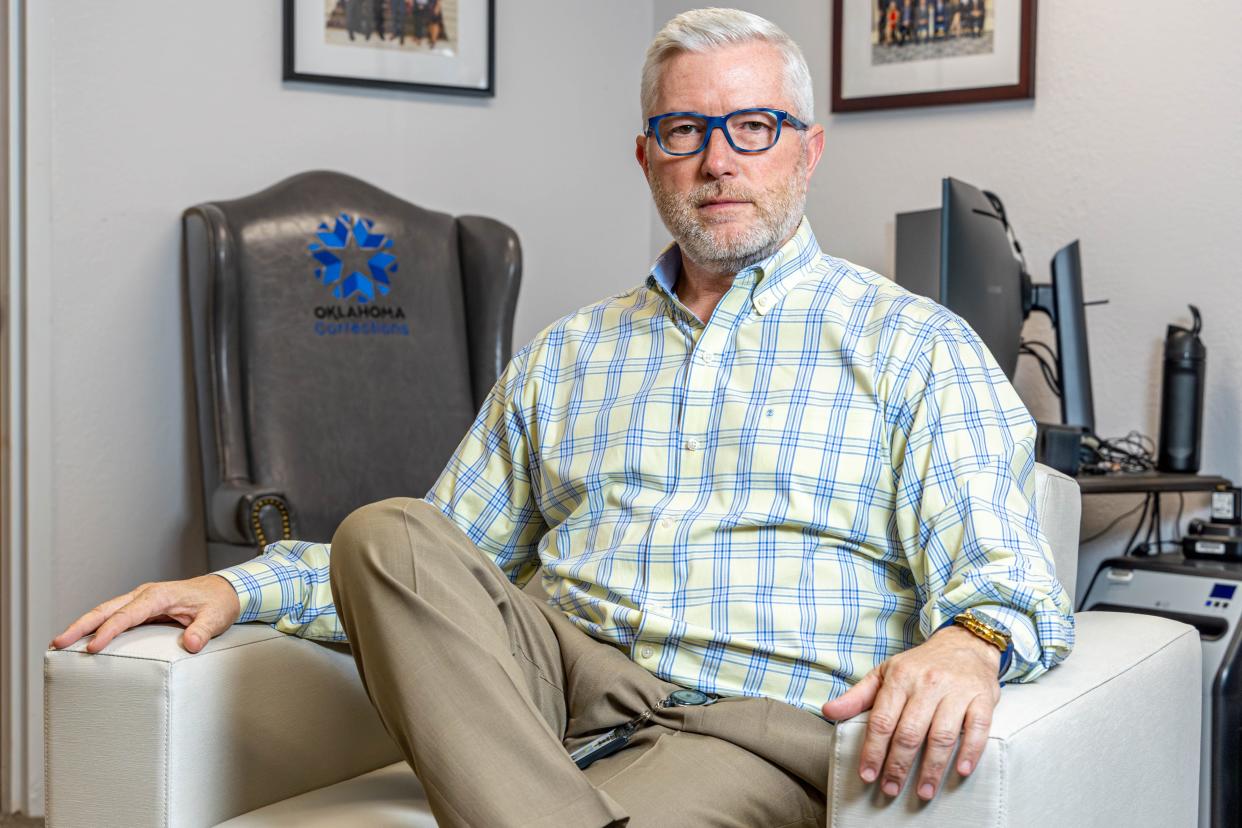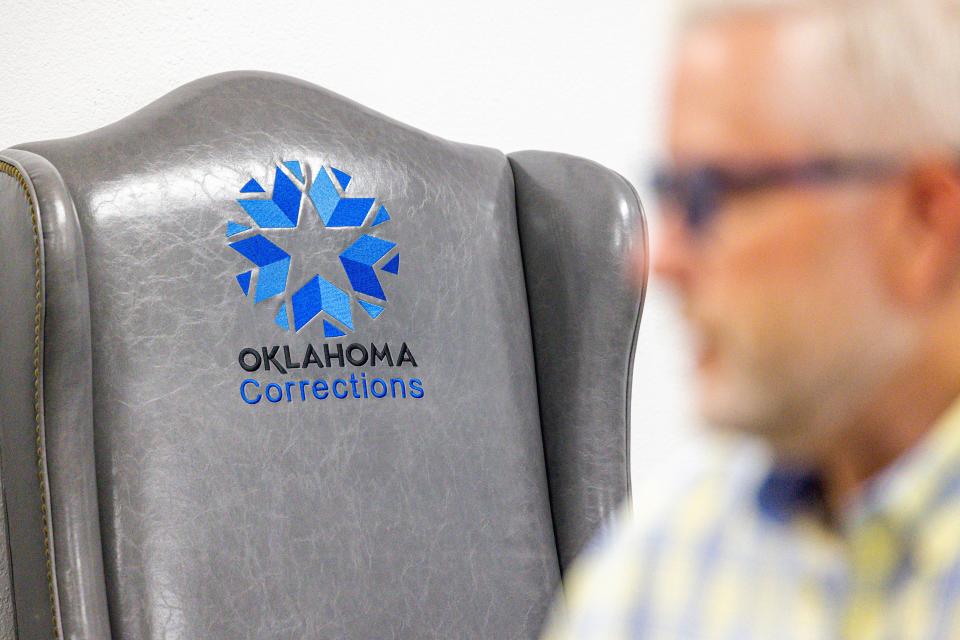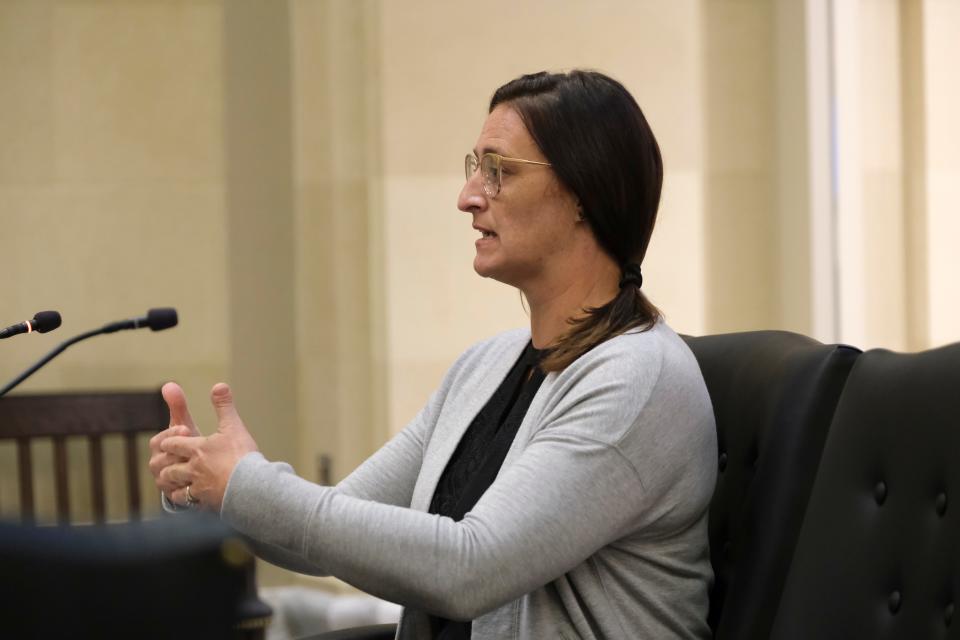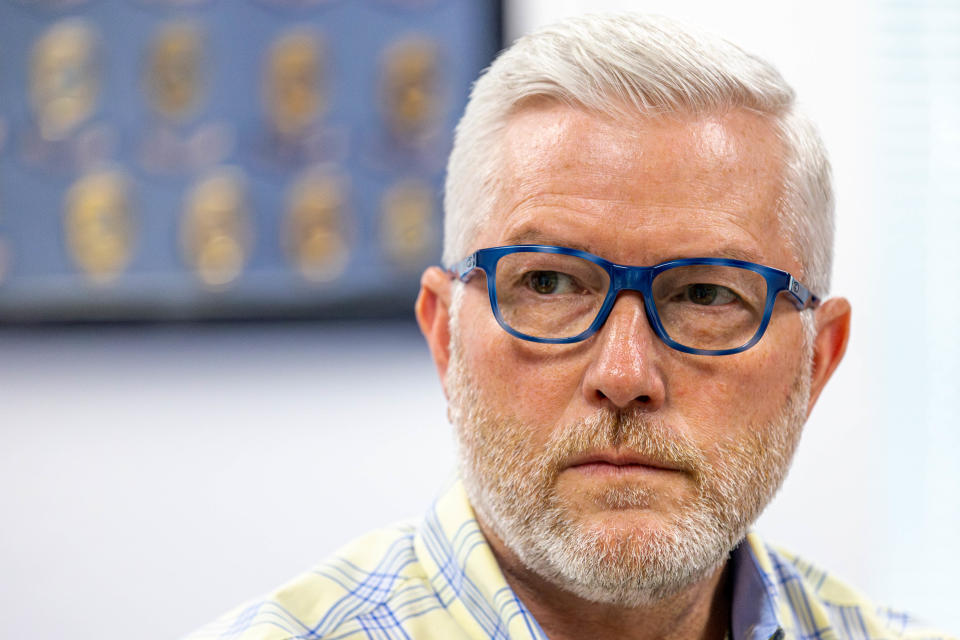Nearly a year in, new director of state prisons says 'culture change' under way

- Oops!Something went wrong.Please try again later.
Steven Harpe swiveled back and forth in a white plush chair in his office as he talked about the most significant challenges he’s faced since becoming director of the Oklahoma Department of Corrections last year. He had been talking in rapid succession for more than 10 minutes without hardly taking a breath when he suddenly paused.
“Oh man, a year, I’ve been in this job for almost a year now,” Harpe said with a tinge of shock, like a man who feels like he’s running out of time.
Harpe was sent by Gov. Kevin Stitt to lead the state’s prison system in 2022, tasked with orchestrating a culture change in a state agency that has long been plagued by overcrowding, deteriorating conditions and accusations of inmate abuse.
Harpe previously worked as chief information officer at Gateway Mortgage Group, the company founded by Stitt, before the governor made him executive director of the Office of Management and Enterprise Services in 2019. Stitt then tapped him to become his chief operating officer for state government, a position created by the governor to lead his vision for streamlining state government and improving how agencies deliver services.
Like the governor, Harpe talks often about efficiencies, management strategies and other approaches more commonly deployed in the private sector. During a recent interview with The Oklahoman inside his Oklahoma City office, Harpe discussed how he’s tried to implement not just a cultural change within the state’s prison system, but also undertake significant infrastructure improvements.
More: After whistleblower alleged DOC covered up rapes, Oklahoma House committee hearing begins
One of his first tasks was to take his management team off-site for a five-day planning retreat, where they performed a SWOT (strengths, weaknesses, opportunities and threats) analysis, the popular business method for identifying strengths and weaknesses and partially developed by the Harvard Graduate School of Business.
What Harpe found was a medical staff that was woefully underpaid compared to the industry standard, correctional officers who didn't feel appreciated, a lack of mental health support workers, and outdated technology.
“There are 321 items over the next two years that we are attacking. We track it weekly,” Harpe said about the goals that came out of that planning retreat.
Prison officials said the strategic plan already has led to significant changes, ranging from new computers to new managers tasked with improving both employee and inmate needs. Employee retention has improved, Harpe said, and a massive technology update is under way.
'We don't retaliate; I'm not a retaliatory guy'

But any progress the agency has made has been overshadowed in recent weeks by accusations of abuse and retaliation against inmates and employees. Former employees with the Corrections Department have accused the agency of not taking seriously incidents of rape involving guards at Eddie Warrior Correctional Center, a minimum security prison for women in Taft.
“I told them there were at least eight of these rapes and sexual assaults that were happening between officers and inmates, and every one of them got to resign,” former Corrections Department psychologist Whitney Louis told Oklahoma Watch, which was the first to report the allegations. “Like there were no charges brought to them. There was no investigation.”
Louis filed a Prison Rape Elimination Act complaint that she says was never investigated. She and other former department employees told their stories during a recent hearing held by the Oklahoma House Committee for Criminal Justice and Corrections, where lawmakers raised concerns about the agency's leadership.

The Corrections Department previously had called the accusations unsubstantiated and the comments of “disgruntled” former employees.
In his remarks at the committee hearing, Harpe denied the allegations, but would not openly speak about the specific issues raised because of pending litigation.
“This has strained our relationship,” Rep. Justin Humphrey, the committee’s chairman, told Harpe about his unwillingness to discuss the issue in public.
Harpe also declined to comment to The Oklahoman on the specifics of the accusations but said the comments made at the hearing presented an unfair depiction of his agency.

“The thing about corrections is, it's so easy, and some of that happened … to just try to drum up (stuff) and beat up on corrections ... to get attention,” Harpe told The Oklahoman. “The truth is, there's a lot of good things going on here.”
Harpe also rejected accusations of retaliation against former employees.
“Regardless of what you hear, we don't retaliate; I'm not a retaliatory guy,” Harpe said.
“I have an open-door policy. Anyone in this agency, from the mailroom all the way up, can come see me anytime they want. And some have taken advantage of that, but some are still very afraid because there are people in the shadows that want to say, ‘You're gonna get retaliated against.' But that’s not the case.”
'We have found issues and problems'

Harpe also countered the narrative of a hostile work environment by pointing to an increase in employee retention. Nearly 30% of staff were leaving the agency each year when Harpe arrived, but the rate has fallen to 16.5%, according to Corrections Department officials.
A new chief people officer position was created to address employee needs, but Harpe said he also has looked to improve the prison experience for inmates. A newly created chief of offender advocacy official regularly meets with inmates to find ways to improve their safety and health.
But Harpe also hears complaints directly when he regularly visits prisons — often unannounced — and asks inmates what they need.
Harpe said some have discouraged him from hearing out inmate complaints because of a belief they might not be truthful.

"But I will tell you so far, and I talk to inmates all the time, every time I chase something down (that they told me about) I find that they've been right,” Harpe said. “When they say I don't have a bed, I don't have blankets, I haven't been fed in 24 hours — every time we chase that down, we have found issues and problems.”
Stitt said he's pleased with Harpe's work so far, calling him an "asset" at the Corrections Department.
“He is making the department more streamlined, and his efforts have contributed to our goal of making Oklahoma a top 10 state by achieving the second lowest recidivism rate in the nation," Stitt said in an emailed statement to The Oklahoman.
As Harpe moves forward on his multi-year plan, which includes relocating the administrative offices to downtown Oklahoma City, creating a new correctional officer training facility, and pushing for more workforce training programs for inmates, he said building a new culture around respect for employees and inmates has been his top goal.
“What matters to me more than anything is that we're treating our people with respect and humanity, that we're treating inmates with respect to humanity,” Harpe said. “Anything that I've been involved with when it comes to people exiting the agency (over the last year) has been (because that) goal wasn't being accomplished.”
This article originally appeared on Oklahoman: Oklahoma prison director Steven Harpe working to change agency

